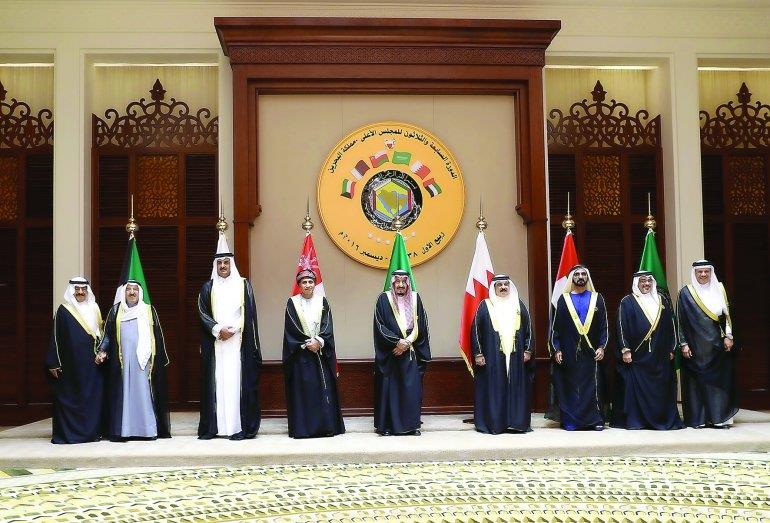
GCC leaders call for joint action to address crises
H H Sheikh Jassim bin Hamad Al Thani, Personal Representative of the Emir and members of the official delegation accompanying the Emir also attended the session.
Addressing the summit, The Custodian of the Two Holy Mosques King Salman bin Abdulaziz Al Saud of Saudi Arabia said that the current circumstances in the region are highly complicated which is obvious to everyone as well as the crises it was facing, "requiring all of us to work together to confront and deal with them in a spirit of responsibility and determination and intensify efforts in order to consolidate the foundations of security and stability of our region as well as development and prosperity for our countries and peoples."
He expressed satisfaction over what has been achieved by the competent agencies of the GCC council over the past year in accordance with mechanisms adopted by the council which aim to raise the level of cooperation and coordination, including the decision of establishing the Economic and Development Affairs Commission which began its work recently to promote joint action in the economic and development fields.
King Salman said that the sad situation being suffered by some Arab countries, characterized by terrorism, domestic struggle and bloodshed, is an imperative result of the alliance of terrorism, sectarianism and flagrant interference, leading to their destabilisation and breach of security.
On the situation in Yemen, King Salman affirmed that efforts are being exerted to end the struggle there in what could achieve security and stability under the leadership of its legitimate government and according to the GCC initiative, outcomes of the national dialogue and UN Security Council resolution No. 2216, thanks to the endeavors offered by the UN special envoy to Yemen.
As for the situation in Syria, King Salman said, "We are all saddened to see what is happening there, including killings, displacement and suffering of the Syrian people, mounting pressure on the world community to intensify efforts to stop bloodshed and find a political solution guaranteeing the achievement of security and stability as well as preserving the unity and integrity of the Syrian territories."
The Emir of Kuwait H H Sheikh Sabah Al Ahmad Al Jaber Al Sabah said that the region is currently faced with grave challenges, where on the economic front, dwindling oil prices are a major concern.
He also added that there needs to be a shift in national ideologies, together with fresh cooperation fields, in order to cope with these challenges.
He highlighted the need for increased strategies to bolster GCC cooperation in efforts to amass further accomplishments that will reinforce solidarity among the Gulf nations.
On the scourge of terrorism, he said that it poses a threat to regional security and stability, which calls for concerted efforts to eliminate this mounting threat.
Sheikh Sabah Al Ahmad Al Jaber Al Sabah stressed the need for constructive dialogue between the GCC and Iran, noting that the talks should centre on compliance with international law, including sovereign rights.
He urged Tehran to cease meddling in the internal affairs of other nations, noting that the agenda for this GCC summit includes numerous pivotal issues. Speaking on developments in Iraq, the Emir of Kuwait expressed satisfaction over the progress made in the fight against the so-called Islamic State (ISIS), as he wished the country a prosperous and bright future.
On the Palestinian conflict, Sheikh Sabah Al Ahmad Al Jaber Al Sabah regretted that efforts to establish peace remain at an impasse, noting that the international community is preoccupied with other issues.
H M King Hamad bin Isa Al Khalifa of Bahrain said that Gulf Summit has come in the light of unprecedented political and economic events facing the whole world, Which requires the highest levels of cooperation and integration among the GCC states.
The King of Bahrain commended the GCC member states' dedicated efforts to achieve economic development, hailing landmark strides, which contribute to citizens' prosperity and well-being and strengthen joint march.
King of Bahrain hailed projects, initiatives and economic agreements sealed between member countries, citing particularly the GCC Common Market, the power and water grid as well as the planned customs union, modern telecommunications and transportation network towards comprehensive integration which features on the summit priorities.
While describing security and development as being interrelated, he urged the GCC countries to upgrade and activate defence and security pacts so as to confront threats and the scourge of terrorism and protect Gulf nations and peoples and preserve achievements.
He saluted the success of the GCC member states in confronting the chaos resulting from extremism and terrorism and preserving their development, progress and prosperity, which inspired many other countries that aspire to stability and peace.
GCC Secretary-General Dr. Abdullatif bin Rashid Al Zayani said that the Council is heading towards consolidation of economic unity, and achieving comprehensive economic citizenship under a secure and stable environment.
Al Zayani stressed that all decisions of the council to strengthen integration of the GCC joint action and expand the areas of cooperation are being implemented carefully.
Bahrain News Agency quoted the Qatari Ambassador to Bahrain, Shaikh Jassim bin Mohammed Al Thani, as saying that the GCC peoples anticipate so much from this summit that will unify the ranks, boost the cooperation process towards the future in the mutual interest. The summit gains special importance as it comes during exceptional circumstances witnessed in the Gulf region and the Mideast. He cited the challenges and regional and international developments which require more coordination and planning among the GCC countries to preserve their security and stability.

Legal Disclaimer:
MENAFN provides the
information “as is” without warranty of any kind. We do not accept
any responsibility or liability for the accuracy, content, images,
videos, licenses, completeness, legality, or reliability of the information
contained in this article. If you have any complaints or copyright
issues related to this article, kindly contact the provider above.

















Comments
No comment